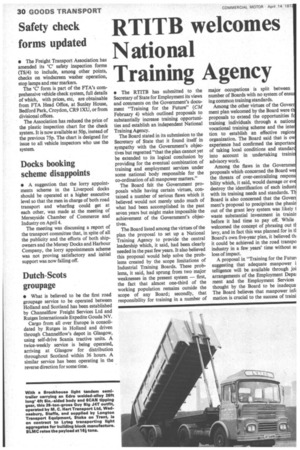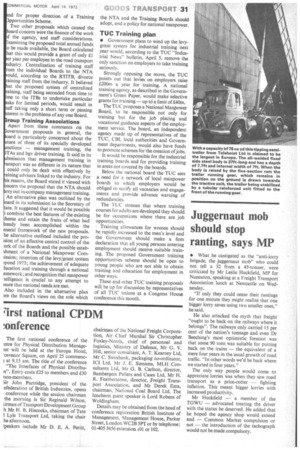RTITB welcomes National Training Agency
Page 32

Page 33

If you've noticed an error in this article please click here to report it so we can fix it.
• The RTITB has submitted to the Secretary of State for Employment its views and comments on the Government's document "Training for the Future" (CM February 4) which outlined proposals to substantially increase training opportunities and establish an independent National Training Agency.
The Board stated in its submission to the Secretary of State that it found itself in sympathy with the Government's objectives but regretted "that the plan cannot yet be extended to its logical conclusion by providing for the eventual combination of training and employment services under some national body responsible for the co-ordination of all manpower matters."
The Board felt the Government proposals while having certain virtues, contained a number of serious flaws which it believed would not merely undo much of what had been accomplished in the past seven years but might make impossible the achievement of the Government's objectives.
The Board listed among the virtues of the plan the proposal to set up a National Training Agency to provide the central leadership which, it said, had been clearly needed in the past few years. It also believed this proposal would help solve the problems created by the scope limitations of Industrial Training Boards. These problems, it said, had sprung from two major weaknesses in the present system — first, the fact that almost one-third of the working population remains outside the scope of any Board; secondly, that responsibility for training in a number of major occupations is split between number of Boards with no system of ensu ing common training standards.
Among the other virtues of the Gover ment plan welcomed by the Board were t proposals to extend the opportunities f training individuals through a nation vocational training scheme and the inte tion to establish an effective region organization. The Board said that is o experience had confirmed the importan of taking local conditions and standar into account in undertaking traini advisory work.
Among the flaws in the Governme proposals which concerned the Board we the threats of over-centralizing respons bility which, it said, would damage or ev destroy the identification of each indust with its training needs and standards. TI1 Board is also concerned that the Gov merit's proposal to precipitate the pha out of the grant levy system was likely t waste substantial investment in trainin before it had time to pay off. While welcomed the concept of phrasing out ti levy, and in fact this was planned for in ti Board's own five-year plan, it believed th; it could be achieved in the road transpo industry in a few years' time without at loss of impact.
A proposal in "Training for the Futur■ suggesting that adequate manpower i telligence will be available through joi arrangements of the Employment Depal ment and the Employment Services thought by the Board to be inadequa The Board believes that manpower infk mation is crucial to the success of traini nd for proper direction of a Training pportunities Scheme.
Two other proposals which caused the card concern were the finance of the work f the agency, and staff considerations. xamining the proposed total annual funds o be made available, the Board calculated hat this would provide a grant of only 1 er year per employee in the road transport dustry. Centralization of training staff rom the individual Boards to the NTA ould, according to the RTITB, divorce aining staff from the industry. It believed at the proposed system of centralized aining, staff being seconded from time to me to the ITBs to undertake particular sks for limited periods, would result in aff taking only a short term or passing crest in the problems of any one Board.
roup Training Associations Apart from these comments on the overnment proposals in general, the oard is particularly concerned about the ture of three of its specially developed notions — management training, the TAs and hgv driver training. It said in its bmission that management training in • nsport was so different in its nature that could only be dealt with effectively by aining advisers linked to the industry. For is reason, the Board stated it viewed with ncern the proposal that the NTA should rry out in-company management training. An alternative plan was outlined by the card in its submission to the Secretary of tate. It suggested that it would be possible combine the best features of the existing heme and retain the fruits of what had ready been accomplished within the eneral framework of the new proposals. be alternative outlined included the proision of an effective central control of the ork of the Boards and the possible estabshment of a National Manpower Corniission; retention of the levy/grant system :iyond 1973; the achievement of adequate lucation and training through a national amework ; and recognition that manpower telligence is crucial to any attempt to tsure that national needs are met.
Also included in the alternative plan 3re the Board's views on the role which the NTA and the Training Boards should adopt, and a policy for national manpower.
TUC Training plan
• Government plans to wind up the levygrant system for industrial training next year would, according to the TUC "Industrial News" bulletin, April 5, remove the only sanction on employers to take training seriously.
Strongly opposing the move, the TUC points out that levies on employers raise £200m a year for training. A national training agency, as described in the Government's Green Paper, would make selective grants for training — up t6 a limit of £40m.
The TUC proposes a National Manpower Board, to be responsible not only for training but for the job placing and vocational guidance aspects of the employment service. The board, an independent agency made up of representatives of the TUC, CBI, local authorities and Government departments, would also have funds to promote schemes for the creation of jobs. It would he responsible for the industrial training boards and for providing training in areas not covered by the boards.
Below the national board the TUC sees a need for a network of local manpower boards to which employers would be obliged to notify all vacancies and engagements and provide advance warning of redundancies.
The TUC stresses that where training courses for adults are developed they should be for occupations where there are job opportunities.
Training allowances for women should be rapidly increased to the men's level and the Government should make a firm declaration that all young persons entering employment should receive suitable train ing. The proposed Government training opportunities scheme should be open to young people who are not able to obtain training and education for employment in other ways.
These and other TUC training proposals will be up for discussion by representatives of all TUC unions at a Congress House conference this month.




















































































































































